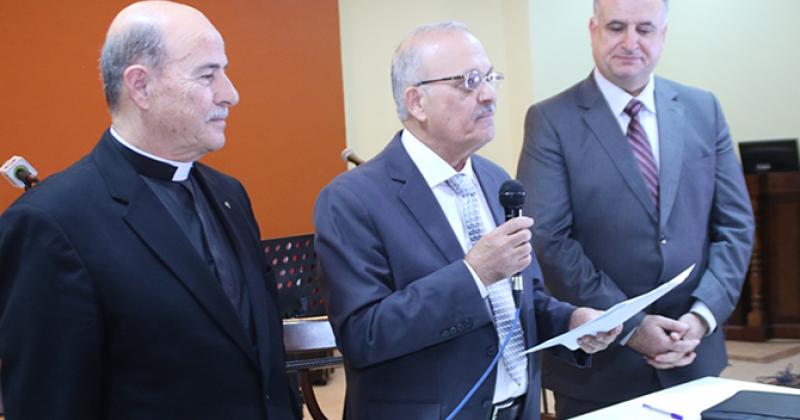In a moving ceremony held at the Free Evangelical Church in Amman’s Khalda neighbourhood on November 14, members of evangelical churches in Palestine and Jordan announced the creation of a unified coordinating alliance, made up of: the Council of Local Evangelical Churches in The Holy Land, the Council of Evangelical Churches of Galilee and the Jordan Evangelical Council.
Emad Maayah, former MP and retired Jordanian Army Major General who heads the Jordan Evangelical Council, announced the creation of the alliance to local dignitaries, Christian clergy of different denominations, past and present Jordanian MPs, church members from Jordan, Palestine and Israel, and a large crowd of local worshipers.
Evangelical churches that rose up in response to the turn of the 20th century American missionary efforts in Jordan today number 10,000, according to David Rihani, deputy head of the Jordanian Evangelical Council.
The Jordan council includes Baptists, Nazarenes and members of the World Evangelical Alliance, Assembly of God and Evangelical Free Church.
Church leaders from Ramallah, Nazareth and Amman presented the history of their churches and their many spiritual and community services, including at schools, seminaries and hospitals, and a host of other para-church activities.
The New York-based World Evangelical Alliance, established in 1846 and boasting 600 million members, was the first to send congratulations to the newly established alliance, Rihani reported to those attending.
The alliance is aimed at advocating by local governments for recognition. Jordan, Palestine and Israel recognise 13 traditional churches, but none of the evangelical churches are recognised.
Evangelical churches have been registered since as far back as 1920 as religious institutions. In Jordan, the five evangelical churches are registered at the Ministry of Justice. They can carry out religious, educational, humanitarian and community services, but are not authorised to deal with any issues regulated through the personal status laws.
In Jordan, Palestine and Israel, every citizen must have a declared religion and all family affairs (marriage, divorce, adoption and inheritance) are administered and resolved through religious courts.
Christians belonging to the Evangelical churches in these countries attempting to resolve personal disputes can only use a recognised church court.
The newly established church alliance will be preparing to set up church courts so as to be ready to use them once they receive official recognition.
For decades, efforts by local leaders and world Evangelicals to gain recognition have failed.
It is not clear why smaller churches are recognised and are given legal status while Evangelical churches with an active presence and a strong community effort in the region are rejected.
Some argue that the traditional churches (Orthodox, Catholic and Armenian) are opposed to extending recognition, while others say that Anglicans and Lutherans are hesitant to open up the gates for other Protestant churches to receive such recognition.
But the real reason for non-recognition by the government might have to do with issues of internal governance that the new alliance might resolve.
Evangelicals are a trans-denominational movement that adhere to a literal interpretation of the Bible and give high priority to spreading Christianity. As such, they are opposed to a religious hierarchy.
There are no bishops and patriarchs among Evangelicals, as in other churches, which makes it difficult for governments to communicate with or coordinate activities with them.
Each church is independent, even though in recent years a strong effort has been made to bring some sort of unified coordinating structure to their internal and national governance structures.
This unification effort will help resolve one of the obstacles often used against Evangelicals who do not have a traditional hierarchy.
In the Middle East, strictly spiritual missionary efforts among the Muslim-majority populations are not allowed and efforts to convert non-Muslims are officially frowned upon.
Local Evangelical church leaders say that they abide by the laws of the land and make themselves available to anyone who asks for spiritual guidance, but are committed to refraining from any public proselytising.
While Evangelism in Jordan and Palestine has its roots in the times of foreign missionaries, today’s leaders are entirely local, mostly because of the autonomous and independent nature of Evangelical church governance.
All church leaders as well as the leaders of the newly established alliance are patriotic Arabs well respected in their communities. They would like to practise their faith while holding on to their love of country and homeland.
The announcement of the church alliance on Tuesday began with the singing of the national anthem and various presentations and speeches praising national leaders.
Maayah said that the date of the signing ceremony was meant to coincide with King Hussein’s birth.
Special emphasis was put, in the presentations, on the efforts on behalf of the Palestinian cause, including holding the “Christ at the checkpoint” conference by the Bethlehem Bible College, one of the institutions belonging to the newly established coalition.
Evangelical churches’ effort to have a unified coalition is an important step towards gaining recognition and standing so as to better serve members of their parishes. But a more important effort is needed to bring much wider unity within the already tiny Christian Arab community in Jordan and the Holy Land.
